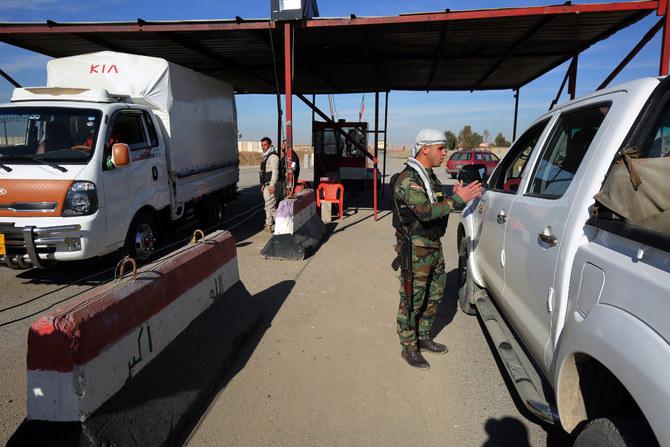
Iraq’s militia state replicates Daesh’s terrorism and criminality
One of Iraqi Prime Minister Mohammed Shia Al-Sudani’s key governing pledges was to normalize the situation throughout central Iraq by transferring control from the military to civilian police, and regular military forces have indeed obediently withdrawn in many provinces.
However, Al-Hashd Al-Shaabi paramilitaries, the Popular Mobilization Forces, clearly aren’t going anywhere, as they continue to loot billions of dollars from Iraq’s cities that suffer under militia occupation comparable in criminality, corruption and brutality to that of Daesh.
A PMF commander, Ali Al-Husseini, categorized his factions’ presence in the liberated cities as “official forces deployed with the knowledge and approval of” the prime minister. He menacingly added: “Calls for withdrawing PMF forces are suspicious and serve an agenda that does not desire stability for Iraq.”
PMF researcher Michael Knights describes Sudani as a puppet. He says: “The real powers are three warlords, each closely tied to Iran” — Hashd leaders Qais Khazali of Asa’ib Ahl-Al-Haq and Hadi Al-Amiri of Badr, and former Prime Minister Nouri Al-Maliki. A PMF deputy described Iraq as having a “resistance” government. He said: “The resistance has come to represent the official view of Iraq, and it is the one running affairs today.”
The Hashd is often misrepresented as posing only a military threat to Iraq, particularly with the recent doubling of its forces to around 240,000 personnel and a similar increase in its budget. But, as with Hezbollah in Lebanon, the PMF has become highly adept at manipulating the corridors of power to monopolize political, judicial, economic, and administrative positions.
Knights has highlighted how in recent months Iraq’s National Intelligence Service, Baghdad airport, anticorruption bodies and customs posts have all fallen under the group’s control. This is in addition to major institutions such as the Interior Ministry, already dominated by the Hashd. PMF influence over Iraq’s Supreme Court, via senior judge Faiq Zaydan, enabled the PMF to dominate the incoming government, despite suffering humiliating losses in the 2021 elections.
In many larger cities, such as Mosul and Tikrit, a dozen different PMF factions rival one another for paramilitary and commercial dominance via various “economic offices.” In Sunni-majority cities and ethnic melting-pot rural regions, sectarian Shiite forces behave as conquering military armies, while parasitically bleeding every last dinar out of local economies.
When Hashd forces captured the multiethnic city of Kirkuk in 2017, large numbers of Kurds fled, including members of the Kurdistan Democratic Party who warned that the city had been “occupied” by hostile Shiite militias. This month, in response to KDP plans to reopen an office in Kirkuk, the Hashd’s Asa’ib Ahl-Al-Haq faction set up a protest camp and blocked major roads, reducing the city to chaos.
When citizens protested against these actions, the police opened fire on them, resulting in numerous casualties and one death. In May, a Turkmen PMF faction engaged in a gun battle against Badr PMF forces for control of lucrative checkpoints around Kirkuk airport, prompting intervention by Iranian Revolutionary Guard officers.
Investigators have shown how throughout central Iraq, the PMF illegally seized vast lands and thousands of houses as “war spoils.” A real estate lawyer investigating these matters in Mosul said that what occurred after 2017 was a continuation of what happened under Daesh “with only some changes in the titles.” He said the Hashd “took advantage of the security vacuum… and manipulated property records through their economic offices.”
Nineveh’s governor, Nawfal Sultan Al-Akoub, was jailed for crimes including colluding with PMF powerbrokers to embezzle more than $70 million of reconstruction funds. Akoub blamed Asa’ib Ahl-Al-Haq for corruptly seizing vast tracts of Mosul real estate, lamenting that they exploited him then abandoned him to his fate. The Nineveh Criminal Court investigated a network of PMF-affiliated real estate brokers complicit in forging documents to steal 9,000 properties.
With the establishment of the PMF’s Muhandis General Company, named after deceased Hashd leader Abu-Mahdi Al-Muhandis, militias can dominate Iraq’s economy with billion-dollar revenue streams, monopolizing government tenders and securing preferential trading terms. The PMF meanwhile controls government departments with multibillion-dollar budgets. One academic paper describes the phenomenon of “crime-terror convergence,” as Hashd forces and Daesh remnants transform the Iraq-Syria borders into “a hub for the smuggling of weapons, drugs, oil, and people.”
This corruption, brutality and organized crime is the surest way of driving Iraqi demographics back into the arms of groups such as Daesh. Thousands of individuals have been “forcibly disappeared” by Hashd militias. In one single incident in 2016 in Saqlawiyah in Anbar, at least 643 men and boys were abducted and presumably massacred by PMF paramilitaries.
As the Hashd has become more widely hated, even among Shiite demographics, it has become increasingly impossible to exploit election processes to cling on to power: so at some point the Hashd will inevitably abandon the sham “democratic” process altogether and use its military and political might to stage a full-blown coup, bolstered by Hezbollah and other aligned regionwide forces.
I lose count of the articles I write warning that the international community is asleep at the wheel, failing to respond to events with glaring global ramifications. The West will clearly not lift a finger to help cut the Hashd down to size. But we should at least be conscious of the ramifications of states such as Lebanon, Syria and Iraq falling under monopolized control of factions who are overtly committed to attacking the West and Arab states.
The Iran-GCC détente has merely neutralized international focus on the Hashd and its allies, allowing them to quietly and uninterruptedly expand in size, power and wealth — to the extent that they have become the dominant face of the Iraqi state.
The Hashd has never had it so good. And one day soon it will fully emerge to constitute the regionwide threat of a hundred new Daeshes.
Source » arabnews.com





